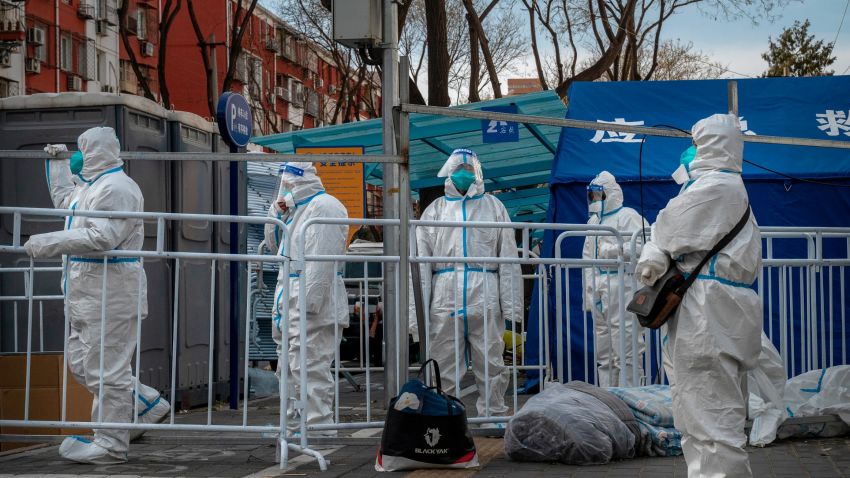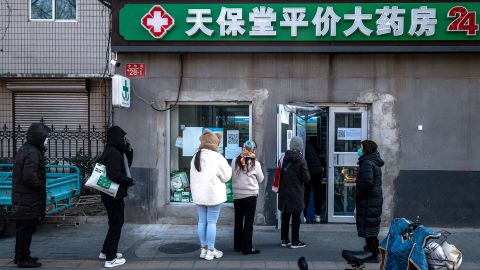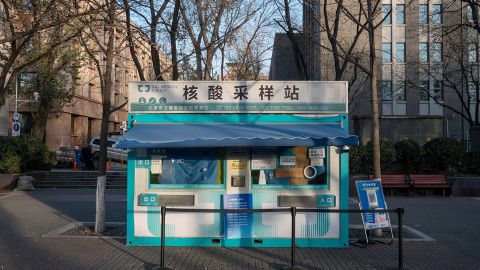Editor’s note: A version of this story appeared in CNN’s Meanwhile in China newsletter, a three-weekly update that explores what you need to know about the country’s rise and how it affects the world. Sign up here.
Beijing
Cnn
—
Empty streets, deserted malls and residents keeping away from each other are the new normal in Beijing, but not because the city, like many Chinese cities before it, is under a “zero-Covid” lockdown.
This time it’s because Beijing has been hit by a significant and widespread outbreak, the first for the Chinese capital since the start of the pandemic, a week after leaders eased the country’s tightening policy against Covid.
The impact of the outbreak in the city was visible in the upscale Sanlitun shopping district on Tuesday. There, the usually busy shops and restaurants were without customers and, in some cases, operated with skeleton crews or offered take-out only.
Similar scenes are unfolding across Beijing as offices, shops and residential communities report being understaffed or changing ways of working as employees fall ill with the virus. Meanwhile, others are staying at home to avoid getting infected.
CNN
” data-fave-thumbnails=”{“big”:{“uri”:”https://media.cnn.com/api/v1/images/stellar/prod/221201134742-covid-china-beijing-112922.jpg?c=16×9&q=h_540,w_960,c_fill”},”small”:{“uri”:”https://media.cnn.com/api/v1/images/stellar/prod/221201134742-covid-china-beijing-112922.jpg?c=16×9&q=h_540,w_960,c_fill”}}” data-vr-video=”” data-show-name=”The Lead” data-show-url=”https://www.cnn.com/shows/the-lead” data-check-event-based-preview=”” data-network-id=”” data-details=””>

Expert: China failed to prepare residents for end of zero-Covid policy
A community worker told CNN that 21 of 24 workers at his Beijing neighborhood committee office, which is charged with coordinating residential issues and activities, have fallen ill in recent days.
“Because our superiors are mostly infected, we aren’t given much work,” said employee, Sylvia Sun. “The (usual) events, talks, performances, parent-child activities are definitely not going to be held.”
Beijing, which was already experiencing a small-scale outbreak before the new rules, is now at the forefront of a new reality for China: Not since the early days of the pandemic in Wuhan have Chinese cities faced an outbreak without strong control measures in place.
But for a place that assiduously monitored every case until the beginning of this month, there is now no clear data on how far the virus has spread. China’s new Covid rules have significantly reduced testing requirements that once dominated daily life, and residents have instead switched to using home antigen testing when available, leaving official numbers unreliable.

China’s National Health Commission (NHC) on Wednesday gave up tracking all new Covid cases, announcing it would no longer include asymptomatic infections in its daily tally. It had previously reported these cases, albeit in a separate category from “confirmed” or symptomatic ones.
“It is impossible to accurately capture the actual number of asymptomatic infections,” the NHC said in an advisory, citing reduced levels of official testing.
Authorities reported 2,249 symptomatic Covid cases nationwide for the previous day on Wednesday morning, 20% of which were detected in the capital. Those figures are also believed to be influenced by the reduction in testing. CNN reports from Beijing indicate that the overall case count in the Chinese capital could be many times higher than recorded.
In a Twitter post, James Zimmerman, a Beijing-based lawyer and former president of the American Chamber of Commerce in China, said about 90 percent of people in his office had Covid, up from about half a few days ago. .
“Our ‘work at home’ policy is now ‘work at home if you are well enough.’ This thing came like a speeding freight train,” she wrote Wednesday.
Experts said China’s relatively low number of previously infected Covid-19 patients and the lower efficacy of its widely used inactivated virus vaccines against Omicron infection, compared to older strains and mRNA vaccines, could allow the virus to spread rapidly.
“The current strains will spread faster in China than they have spread to other parts of the world because those other parts of the world have some immunity against infection from previous waves of previous Omicron strains,” said Ben, a professor at Omicron. epidemiology of the University of Hong Kong. Cowling.

The extent of serious illness or death in Covid-19 outbreaks typically takes time to be clear, but there are signs of an impact on the health system – with Beijing authorities urging patients who are not critically ill not to seek help from Emergency Services.
The city’s main hospitals checked in 19,000 patients with flu symptoms from Dec. 5 to 11, more than six times the previous week, a health official said on Monday.
The number of patients visiting fever clinics was 16 times higher on Sunday than the previous week. In China, where there is no strong primary care system, visiting the hospital is common for minor illnesses.
So far, however, there have only been 50 serious and critical cases in hospitals, most of which had underlying health conditions, Sun Chunlan, China’s top official charged with managing the COVID-19, said on Tuesday during an inspection of the response. Beijing epidemic.
“Currently, the number of newly infected people in Beijing is increasing rapidly, but most of them are asymptomatic and mild cases,” said Sun, who also called for more fever clinics to be set up and ensured that the supply of medicines – which have been hit by a surge in purchases in recent days – was on the rise.
Prominent Shanghai physician Zhang Wenhong has warned that hospitals should do everything possible to ensure that healthcare workers don’t become infected as quickly as people in the communities they serve. Such a situation could lead to a shortage of medical staff and infections among patients, he said, according to local media reports.
Concerns about scarcity and access to medicines and treatments have been palpable in the public debate, including on social media. There, a Beijing reporter’s account of her time in a temporary hospital for Covid-19 treatment ignited a social media firestorm, with a related hashtag gaining more than 93 million views on the Chinese platform. Weibo from Monday.
Social media users have wondered why the reporter, who showed off her twin room and access to fever medicine in a video interview released by her employer, the Beijing Broadcasting Station on Sunday, received such treatment while others were struggling.
“Awesome! A young reporter gets a job at a temporary hospital and takes liquid ibuprofen for children which is hard to find for parents in Beijing,” read one sarcastic comment, which garnered thousands of likes.
Another popular response complained that “ordinary people” are staying at home with children and the elderly with high fevers.
“Could you give me (his) bed if I call (the hospital)?” asked the Weibo user.
Amid virus fears, residents rushed to buy canned peaches, following rumors that the vitamin C-laden snack could prevent or cure Covid. Chinese state media have since warned people that preserved fruit is not a Covid remedy nor a substitute for medicine.